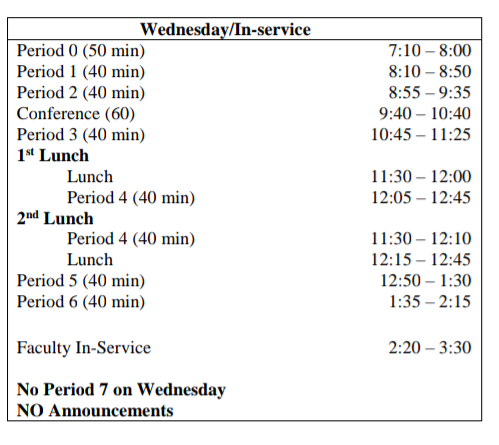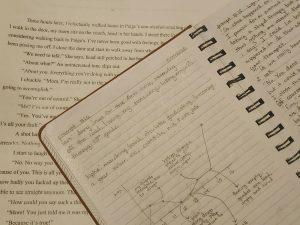What’s Happening to Conference Period?

August 16, 2019
Sixty minute classes four days a week, no mercy for being sick or having a doctor’s appointment or family emergency. No chance to make up a Science lab or do laps for P.E. No opportunity for students to have one-on-one time with a teacher to better understand a concept. This seems to be Sahuaro’s non-plan for the start of the school year. For years, Sahuaro High School has had a conference period before first period every Tuesday and Thursday. It is an opportunity to go talk to your teachers, makeup work or tests, or do homework for forty-minutes twice a week. Students at Sahuaro have grown accustomed to conference period, but this year it’s changing.
Last year, talk about adding a seventh-period to Sahuaro’s bell schedule circulated. There was a school-wide poll that let students and parents decide if they wanted our bell schedule to change to seven periods or a block schedule, meaning having longer classes but less of them each day. The poll decided that there would not be a seventh-period, but the administration started to notice some of conference period’s current flaws.
It was announced to teachers on their first Wednesday meeting of the year that conference period would be officially changed from Tuesdays and Thursdays before first period, to Wednesdays after second period. These changes were to be put in place with the hopes of getting more students to take part in conference period. Many students used conference period as a time to sleep in, leave campus to get food, or to go anywhere else during the allocated time instead of using it to further their education. The principal of Sahuaro, Mr. Estrella, said, “Many of the people who are participating in conference period are those who volunteer to better their education, and conference period is too valuable to be based on volunteers so I believe it needs to be assigned.”
The administration’s goal was to embed conference period into the school day to boost its effectiveness. Estrella told me that initial polls from students, teachers, and parents said two days of conference period was ideal, but they soon realized it might not be the best decision if they want to enhance participation. They realized that with only forty-minutes, you feel like it’s over before you start doing much of any work. Some students also may not be able to go to more than one class with such little time. It was decided that extending conference period to one hour would greatly improve student’s ability to visit more classes and get more done in that block of time.
Another change with this new conference period schedule is the forty-minute periods on Wednesdays. This has been a concern of many students and teachers, especially those with AP classes. Mr. Estrella says that contributing ten-minutes off a class will make the shortened classes workable. Since students also have conference period the same day, that will allow them to work with their teachers and should help the teachers make up for the lost time.
Administration also had to decide where the students will go if they don’t need to go to other classes since conference period is in the middle of the day. “We are currently deciding between two options, to have the students be randomly placed in different classrooms, or to have them stay in their second period class. The faculty seems to be leaning more towards the first option.” The easiest option would be to have everybody stay in their second period classes for another hour, unless they had to go elsewhere. This, however proposes other issues. What happens when there is a classroom full of students, some not doing anything, and more students entering the already full classroom in need of help? This is why some faculty seems to be leaning towards the second option. If students were to be dispersed equally throughout classrooms, there would be room for students to come in and out and get what they need done.
Passes to go to other classes are also another possible point of concern for teachers. Mr. Estrella says, “The idea is you have to obtain your pass before conference period. You can’t do it the day of, but you need to have it before conference period to be able to go to that class.” Teachers are supposed to regulate and monitor how many passes they’re giving out and how many people will be in their class to make sure students are able to flow in and out of the classroom. One other thing he noted is that all movement will be restricted in the last thirty minutes. This means that you will need to be done with all your other classes and stay in one for the last thirty minutes of conference period. The reason this rule is being set into place it to reduce noise and let people focus on their work.
Though details are still being finalized, students and teachers seem to have very mixed feelings about the changes. Teachers like Mrs. Hughes are excited that, “The students who really need to use conference period and get help will be encouraged to do so. If you’re absent on a Wednesday though, you have to wait a whole week to be able to make up work or tests you could have missed due to there being conference period only one week.” This can put much more stress on the student and can impact their grade too. If you’re absent the day before conference period, you may not be able to even get a pass to visit other teachers.
Recently talks about conference period being cancelled completely have circulated. There was a poll sent out to teachers, and of the sixty who participated, thirty voted to remove conference period in its entirety. Mr. Lundstrom says, “Things are still in a flux. As of now, conference period has been postponed for at least one week. We will hopefully have more accurate answers by next week.”











